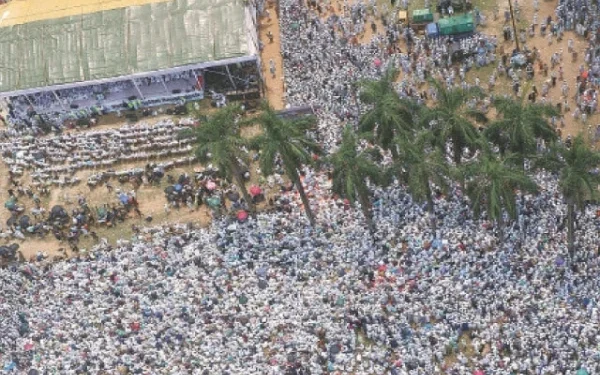Thousands Gather in Bangladesh’s Capital Amid Rising Religious Mobilization
Dhaka, Bangladesh – In one of the largest public demonstrations seen in recent years, Bangladesh’s religious parties organized a massive rally in the capital city of Dhaka. The event, held under the banner of “Protection of Islam Bangladesh”, drew tens of thousands of participants, signaling a renewed vigor among religious and conservative groups following the political vacuum created by the ouster of former Prime Minister Sheikh Hasina.
The demonstration not only showcased the growing influence of religious factions in the country’s political landscape but also highlighted the ideological divisions emerging in post-Hasina Bangladesh.
The Fall of Sheikh Hasina and the Rise of Religious Mobilization
The political landscape in Bangladesh has undergone significant upheaval in recent months. After nearly 15 years in power, Sheikh Hasina stepped down amid widespread allegations of human rights violations, corruption, and political suppression. Facing mounting international pressure and domestic unrest, she reportedly fled to India, where she has so far declined to respond to legal summons related to her government’s alleged abuses.
Her departure has left a political vacuum that is rapidly being filled by religious and right-wing groups, many of which had been marginalized or suppressed during her administration. This newfound freedom has emboldened these organizations to assert their influence on national issues, as demonstrated by the massive turnout in Dhaka.
Rally Demands: Women’s Rights Under Fire
A central theme of the rally was the demand to dissolve the Bangladesh Women’s Commission, a government body tasked with promoting gender equality and women’s empowerment. Protesters accused the commission of “violating Islamic values” by pushing for reforms that challenge traditional gender roles.
Clerical Opposition to Gender Equality
One of the keynote speakers, Mohammad Shahabuddin, a teacher at a prominent women’s madrassa in Dhaka, stated:
“Men and women can never be equal. The Quran has laid out separate roles and responsibilities for each gender. We must respect divine law rather than follow Western ideologies.”
Such remarks have sparked outrage among secular and feminist groups, who view this rhetoric as a threat to the hard-won rights of Bangladeshi women.
Calls to Ban Cultural Activities Deemed “Un-Islamic”
Beyond the issue of women’s rights, rally organizers also called for a nationwide ban on a variety of cultural events and recreational activities. Among the activities they deemed “un-Islamic” were:
- Women’s football matches
- Music shows and concerts
- Theater performances and art exhibitions
- Traditional festivals like kite flying
According to speakers at the rally, these events promote “moral decay” and “Western cultural infiltration.”
Cultural Suppression or Religious Revival?
Critics argue that such demands amount to cultural suppression and risk pushing the country toward religious extremism. However, supporters of the rally insist that their agenda is centered on preserving Islamic identity and moral values in an increasingly globalized world.
A New Political Reality: Religious Influence on the Rise
The Dhaka rally is indicative of a broader trend in South Asian politics, where religious groups are becoming increasingly active and influential. In Bangladesh, where approximately 92 percent of the population identifies as Muslim, religious sentiments hold considerable sway.
Muhammad Umar Farooq, another madrassa teacher and speaker at the event, warned:
“If any future government enacts policies against Islamic values, the Muslim majority will not accept it. We will stand united against any such efforts.”
Interim Government’s Response and Upcoming Elections
In response to the rising religious activism, interim Prime Minister Muhammad Yunus, a Nobel Peace Prize laureate, has attempted to strike a balance between secular governance and religious appeasement. He has announced that general elections will be held by June 2026, with an emphasis on transparency and inclusivity.
Yunus, known for his work in microfinance and poverty alleviation, has expressed concern over the polarizing nature of the current political discourse. He has called on all factions to engage in peaceful dialogue and has promised reforms that respect both democratic principles and the cultural sensitivities of the people.
International Concerns and Human Rights Issues
The massive turnout in Dhaka has not gone unnoticed by international observers. Human rights organizations have raised alarms about the implications of religious groups gaining unchecked political power, particularly concerning gender rights, freedom of expression, and minority protections.
The United Nations Human Rights Council (UNHRC) and Amnesty International have both issued statements urging the Bangladeshi government to ensure that basic human rights are not compromised in the name of religious conservatism.
Sheikh Hasina’s Legacy Under Scrutiny
The fall of Sheikh Hasina has reopened debates about her governance style and legacy. While some credit her with economic growth and infrastructure development, others highlight her authoritarian tendencies, suppression of dissent, and strained relations with religious communities.
Now living in self-exile in India, Hasina faces multiple legal challenges, including accusations of extrajudicial killings, suppression of journalists, and unlawful detentions under anti-terror laws.
The Road Ahead: Balancing Faith, Democracy, and Development
Bangladesh stands at a critical crossroads. With elections on the horizon and religious voices growing louder, the nation must decide how to balance Islamic values with democratic ideals, human rights, and global integration.
The rally in Dhaka has made one thing clear: religious parties are no longer content with being on the sidelines. They are organized, mobilized, and increasingly vocal about shaping the future of Bangladesh.
Whether this will lead to a theocratic shift or a redefined secularism remains to be seen—but the coming months will undoubtedly be pivotal.
Conclusion
The historic rally by religious parties in Dhaka marks a turning point in Bangladesh’s socio-political journey. As the nation navigates the aftermath of Sheikh Hasina’s departure and prepares for upcoming elections, it must address rising religious sentiment, protect civil liberties, and promote inclusive governance. How the government manages these challenges will define not only the future of its democracy but also its standing on the global stage.

























